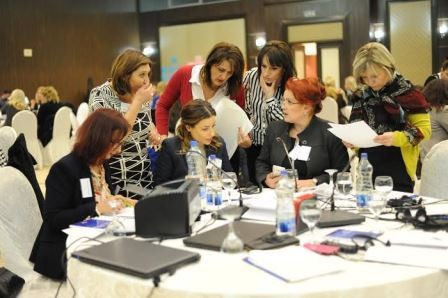Speeches Shim

THE CHALLENGE
The Republic of Macedonia separated peacefully from Yugoslavia in 1991. However, it is yet to complete political and economic reforms required for European integration. The 2016 European Commission’s Progress Report on Macedonia outlined a number of issues that the country must address, including weak checks and balances; rule of law and protection of human rights; as well as media independence and freedom of expression. The most recent Freedom House Nations in Transit Report demoted Macedonia from a "semi-consolidated democracy" to a "transitional government or hybrid regime." The 2016 World Press Freedom Index ranked Macedonia 118th out of 180 countries assessed. USAID’s democracy assistance focuses on helping Macedonia address some of these concerns as it prepares for European Union and NATO accession.
PROJECT AREAS
Rule of Law and Human Rights
USAID is working to advance the protection of human rights and promotion of rule of law in Macedonia. Activities in this area include:
Defending human rights by developing a pool of human rights attorneys; ensuring litigation and representation of human rights violation cases in domestic courts and the European Court of Human Rights; strengthening the role of civil society organizations in promoting and protecting human rights; and developing adequate legal protection for victims of gender-based violence and discrimination, including domestic violence, sexual assault, and trafficking of human beings.
Protecting the rights of vulnerable migrant and refugee groups by increasing understanding of government and civil society; on UNHCR Convention principals and international human rights laws.
Promoting the inclusion of LGBTI members in society by raising public awareness of their needs, building alliances to combat hate speech, and ensuring a safe place for vulnerable members of the community.
Political Processes
Through Increased Political Competition and Accountability, USAID promotes greater citizen participation in political institutions and processes. USAID works with all political parties in the country to increase their ability to engage members, political supporters, and the public at-large on public policy and accountability; improve civil society organizations’ capacity for policy engagement and legislative advocacy; and strengthen Parliament’s ability to perform its legislative and oversight functions more effectively. In addition, USAID works closely with the State Election Commission to enable a better environment for free and fair elections.
Civil Society and Media
USAID helps citizens enact checks and balance and ensure accountability of their government by working to make civil society more effective and by promoting independent media that increases public access, awareness, and engagement on topics of public interest.
USAID supports civil society organizations and youth groups in efforts to improve their communities and works to promote dialogue, strengthen leadership capacity, and provide opportunities to participate in public life and decision-making processes on issues that affect Macedonian society.
Selected Results Since 1993
Democracy and Governance
- Increased municipal financial independence by introducing financial audits, credit ratings and municipal loans.
- Helped to develop and implement the National Anti-Corruption Strategy
- Automated court case management and budget systems.
- Unified and modernized municipal finance and tax administration in all 84 municipalities.
- Supported public presentations, roundtables, and debates to promote diversity and interethnic integration.
- Trained over 3,000 election monitors
- Contributed to free & fair elections in all cycles from 2002 through 2016
- Helped to establish the Macedonian Institute for Media (MIM)
- Supported new Laws on Courts, Enforcement, the Judicial Council, Civil Procedure, Parliament, and NGOs
- Supported the establishment of a reliable system for enforcement of civil court decisions


Comment
Make a general inquiry or suggest an improvement.